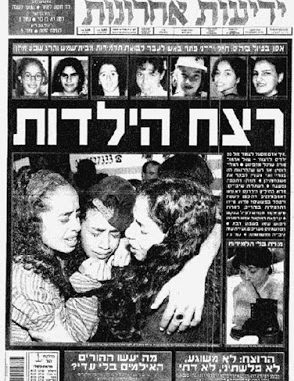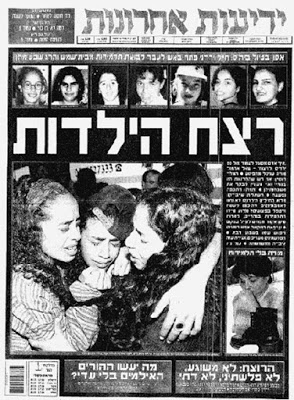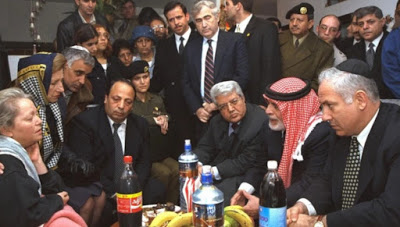
| On March 18, 2014, clan members of the convicted murderer shouted and waved shoes outside Jordan’s parliament demanding Daqamseh’s release [Image Source] |
The Hashemite Kingdom of Jordan this morning released from prison a man called Ahmed Mousa Daqamseh.
Not such a well-known name in Western countries, he’s something of a folk hero among the Palestinian Arabs who constitute the clear majority of Jordan’s population.
This is because he recently won the Arab Idol television competition and his songs are heard everywhere.
No, we’re not being serious. He doesn’t write songs. He doesn’t perform on TV. His fame comes from the fact that he developed a wildly-successful best-selling app for the Android smart-phone platform.
No, no, that’s not true either. We don’t actually think the high school dropout has any facility with technology after years behind bars. No, he’s famous – truly – because he plays center-half in one of Europe’s most-high profile soccer teams and is one of the team’s stars.
No, not that either.
The real truth is Ahmed Daqamseh is a celebrity among Palestinian Arabs because on March 13, 1997 while serving in Jordan’s military as a 29-year-old lowly corporal and posted to a site known to Israelis as Naharayim – meaning two rivers since it’s the point of confluence of the Jordan and Yarmuk rivers (the Jordanians call it Baqura), and for reasons described here, as the Island of Peace (a Hollywood film publicist must have been involved in coming up with that wildly improbable name), he cold-bloodedly opened fire on a group of visiting Israelis.
The Israelis, all brawny men with long years of fighting experience behind them, were heavily armed and chanting slogans impugning the honor of the Jordanian kingdom.
No, sorry again. We’re making that up.
The people on whom he opened fire were schoolgirls – all of them eighth-graders. They had come that morning from the southern Israeli city of Beit Shemesh’s AMIT Fuerst School. They were bused to the Island of Peace for a school field trip, and not a single one of them was armed. Not even with girl-sized machine-guns. Not even with petite hand-grenades.
Here are the names and ages of those whom he shot to death:
Sivan Fathi, 13; Karen Cohen, 14; Ya’ala Me’iri, 13; Shiri Badayev, 14; Natalie Alkalai, 13; Adi Malka, 13; Nirit Cohen, 13. All but little Sivan were from Beit Shemesh itself. She was from Tzelafon.
Six other children were injured. Their lives are remembered by a beautiful memorial at the site of the shooting called, in heart-breaking fashion, the Hill of the Picked Flowers.
Daqamseh told the Jordanian court, a military tribunal of five army judges that tried him on criminal charges, that he had no option but to use his gun, a high-powered, US-made M16 automatic rifle, and fire at the enemy agents because
he was insulted and angered that the girls were whistling and clapping while he was praying [Wikipedia]
He would probably have killed even more children but for the fact that the rifle he grabbed from another soldier jammed. Despite the large scale of the tragic outcome, he was not sentenced to be executed – as the Jordanians have shown they have no problem doing – but instead was ordered to serve a long period of imprisonment.
 |
| Cover of Yediot Aharonot, the day after the Naharayim massacre, March 1997 [Image Source]. The headline reads “The murder of the girls” |
A March 15, 1997 account in the Washington Post paints a pathetic picture:
A high school dropout from the village of Ibdir, the gunman was drafted 12 years ago, his family said. He had two sons and a daughter but no history of violence and was not affiliated with any political group, family members said. “We’re shocked by his action,” Mousa Daqamseh said as tears flowed down his cheeks. “My boy was unstable,” Daqamseh’s mother added. “He had a psychological problem and used to have anxieties.”
She refused to give other details except to say: “He used to sit alone and stare in the open and think. He used to get angry sometimes, but cool down after a long walk.” [“Israeli girls buried as thousands mourn“, Washington Post, March 15, 1997]
Another report at the time called him suicidal:
A Jordanian soldier accused of gunning down seven Israeli schoolgirls in March has a personality disorder and tried to commit suicide in 1989, a psychiatrist testified yesterday. Dr. Nabil Hmoud, a Jordanian army major, told a military hearing that Cpl. Ahmed Daqamseh, 26, is mentally sound but suffers from a personality disorder that may lead him to harm himself or others. He did not say what the personality disorder was… [Pittsburgh Post-Gazette, 17 June 1997]
Whether sane or feigning mental illness, Daqamseh never expressed a shred of remorse for the massacre or the lives he stole. Interviewed by the Jordanian weekly a-Shahed in 20004, he said
“If I could return to that moment, I would behave exactly the same way. Every day that passes, I grow stronger in the belief that what I did was my duty.” [Jerusalem Post, March 12, 2017]
That murderous determination somehow did not make it into the news media at the time:
Fellow soldiers and a woman who claimed to be his mother said the gunman has mental problems. There was no other immediate explanation for his actions. [Reuters, March 14, 1997]
 |
| Dignitaries calling on the bereaved families in the immediate aftermath of the killings [Image Source] |
And as we noted, today (Sunday) he walked free at about 1:00 o’clock in the morning [source].
How is he being received?
- From a syndicated Agence France-Press report [“Jordan minister dubs Israel girls’ killer ‘hero’“, AFP, February 14, 2011]: Jordan’s justice minister on Monday described a Jordanian soldier serving a life sentence for killing seven Israeli schoolgirls in 1997 as a “hero,” drawing an expression of “revulsion” from Israel. “I support the demonstrators’ demand to free Ahmad Dakamseh. He’s a hero. He does not deserve prison,” Hussein Mujalli, who was named minister last week, told AFP after taking part in the sit-in held by trade unions. “If a Jewish person killed Arabs, his country would have built a statue for him instead of imprisonment.” Mujalli, a former president of the Jordan Bar Association, was Dakamseh’s lawyer. “It is still my case and I will still defend him. It is a top priority for me,” he said… The minister’s comments drew a furious response from Israel… “Israel is shocked and recoils from these comments in revulsion,” a foreign ministry statement said… Maisara Malas, who heads a trade unions’ committee to support and defend the soldier, told AFP he handed a letter to Mujalli, demanding Dakamseh’s release. “We cannot imagine that a great fighter like Dakamseh is in jail instead of reaping the rewards of his achievement,” the letter said. Jordan’s powerful Islamist movement and the country’s 14 trade unions, which have more than 200,000 members, have repeatedly called for Dakamseh’s release.
- In April 2013, 110 of the Jordanian parliament’s 120 members signed a petition demanding a pardon for Daqamseh [“
- Sweeping Majority of Jordan MPs Sign Petition Calling for Release of Man Who Killed 7 Israeli Girls“,
- On February 25, 2014, during a debate on the same request in the Jordanian Parliament’s House of Representatives, a group of MPs headed by Ali Al-Sanid again called for the government to release Daqamseh. Here’s part of their manifesto as translated by MEMRI [source] which speaks of the pathetic shooter with alleged mental problems as “…a rare man, peerless among men, a knight who, mounted on glory, acted marvelously for his national cause; of a prisoner who was a source of concern for his jailors and whose name is linked to the suffering of his nation. This man swore by Allah – and, later, by blood and by bullets of lead, like the martyrs – that Palestine is Arab, that it will remain as long as the Arabs remain, that history will have its reckoning… My brothers, I speak of the Jordanian soldier who opened fire at a time of peace [thus] reflecting the desires and conscience of the Jordanians, and their resistance to an agreement of humiliation [the Israel-Jordan peace treaty] unparalleled in history… [We call] for the immediate release of the hero, Jordanian soldier Ahmad Al-Daqamseh, [in order] to put an end to his suffering. Otherwise, this government will be challenging the consensus of the Jordanian people…”
- The English-language Jordan Times, which reflects the kingdom’s official views, doesn’t say. We were unable to find a single mention of him in today’s web edition. Maybe tomorrow. And maybe not.
- The excitement of the people in his home town is captured in a crude YouTube video from the early hours of this morning, mainly filled with the raucous sounds of car horns, Arabic music, women ululating and people shouting jubilantly. This was a happy, happy day.
- “An Arabic hashtag of Daqamseh’s name has been trending on Twitter over the past few days, and the social media outlet has served as a platform for a generally homogenous response.” [“Ahmed Daqamseh, who killed seven Israeli children, widely praised on Jordanian social media“, Albawaba, March 12, 2017]
- “May Allah preserve you in the house of your family, you who embody the most beautiful story of a hero from 1997 to 2017. May Allah have mercy on your father who did not have the chance to see you free, released. The hero, Ahmad Daqamseh.” [Quoting this Arabic-language tweet]
- After arriving at his home this morning, Daqamseh declared he would “stay a soldier in the Jordanian armed forces… I went into jail as a soldier and now I consider myself and my sons soldiers in the armed forces” according to a report today in Israel National News. Based on Arabic news reports, they say he was given a jubilant reception in the village where he lived after his return.
- The Jordanian news site Almadenah [here] today gives the released murderer full-celebrity coverage with numerous photos of dignitaries greeting him in his home village. Even if Arabic is not a language you speak or read, the photos are exceptionally eloquent (we prefer not to reproduce them here).
- Another Jordanian news site, JO24, quotes the ‘hero’ himself saying today in the full flush of his fame and media attention (our translation from Arabic) that he “does not believe in normalization with the Zionist entity; Palestine is one from the sea to the river… and there is no state called Israel“. There’s an Arabic video here recording these profound views of the “hero” as he speaks them.
If there’s any news coverage of the feelings and responses of the families of those sweet girls he murdered, we haven’t found it yet. The same goes for any Jordanian or other Arab voices expressing disgust at the after-the-fact bravado of a man with a big gun who took aim at unarmed girls and has come to fame only because of what happened to them when he pulled the trigger again and again and again.

Leave a Reply